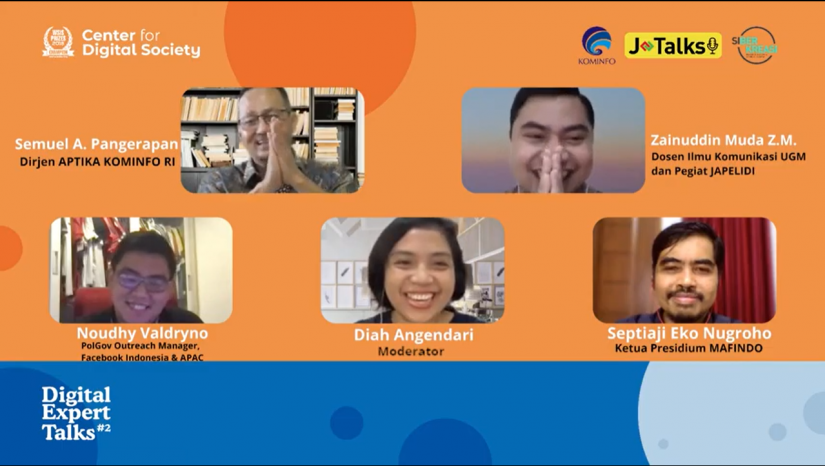
“The urgency now is that we are in a faster digital transformation because of the pandemic,” said Semuel A. Pangerapan, the Director General of Informatics Application in the Ministry of Communication and Informatics (Kominfo) Indonesia. Unfortunately, a couple of surveys show that citizens of Indonesia’s digital literacy is still low. The government through Kominfo tries to increase citizens’ digital literacy so that they are prepared to face the digital transformation era.
Kominfo aims to get 50 million Indonesia’s citizens to have digital literacy by 2024. Since 2020, Kominfo aims to literate 12,5 million people every year through the movements of agents of change. Samuel explained that in order to educate certain groups, we need to use a cultural approach because not all society can be literate just by reading. According to him, the curriculum of digital literacy needs to always be developed. “We need to always remind people about digital literacy but also not be seen as too snobbish,” Samuel said.
“Indonesia’s digital literacy status in 2020 is still moderate and this is worrying,” said Zainuddin Muda Z. Monggilo, a lecturer of the Department of Communication as well as a member of the Digital Literacy Enthusiast Network. According to this lecturer, often called Zam, digital media use needs to be done more responsibly. This is because there is plenty of negative content in the digital media but society’s capacity to think critically is still low. He explained that Indonesia’s digital users are increasing but it is not followed by an increase in digital literacy. According to Zam, if citizens do not continue learning or collaborating, Indonesia’s digital literacy status can decrease.
Zam explained several indicators that someone is digitally literate. First, they have knowledge about hardwares and softwares, Second, they can use search engines to fight misleading information. Third, they know about various chat applications and social media. Fourth, they have a basic knowledge about digital wallet and e-commerce as well as their roles in supporting digital transactions. “In this digital era, we don’t only get important and impactful information but also misleading and dangerous information in the form of misinformation, disinformation, and malinformation better known as hoax,” Zam said.
The danger and strategies to fight off hoaxes was explained by Septiaji Eko Nugroho, The Head of Masyarakat Anti Fitnah Indonesia (Mafindo). Hoaxes, according to Septiaji, can change someone’s behaviour which puts them or other people at risk. In the pandemic era, health hoaxes are often encountered and worsened by society’s polarisation. “If people believe in health hoaxes, the impact could really be damaging,” said Septiaji. To avoid hoaxes, Septiaji reminds people to change their method of reading information in the digital media by always checking the facts through trusted sources. Other than that, society needs to minimize confirmation bias within themselves so that they don’t easily accept or reject information just based on personal likes or dislikes.
“Restrain yourself not to share information that we are not sure of one hundred percent,” said Noudhy Valdryno, Politics and Government Outreach Manager Indonesia and APAC in Facebook. According to Noudhy, society needs to increase their reference sources in order to check the information they get during the pandemic. He explained that Facebook as a social media platform has done several collaborations concerning content management in order to spread verificated information. He said that there is no absolute information during the pandemic so that the society needs to restrain themselves when sharing information and help fight the spread of hoaxes by reporting fake news they encounter in social media.
